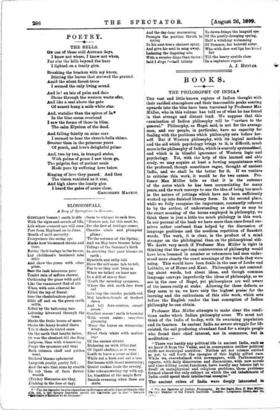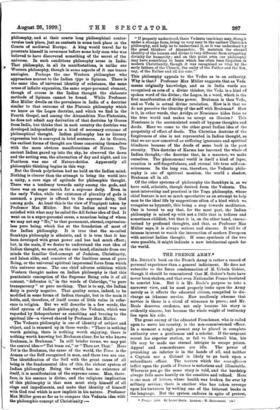BOOKS.
THE PHILOSOPHY OF INDIA.* THE vast and little-known regions of Indian thought with their rarified atmosphere and their inaccessible peaks soaring upwards into the blue have been traversed by Professor Max Miiller, who in this volume has told us of what he has found in that strange and distant land. We suppose that this examination of Indian philosophy will be " caviare to the general." Philosophy, as Hegel said, is not for the average man, and our people, in particular, have no capacity for dealing with the problems which philosophy sets before her- self. But if Western philosophy, with its logical methods and the aid which psychology brings to it, is difficult, much more is the philosophy of India, which is scarcely systematised, and which is in blissful ignorance of Western logic and psychology. Yet, with the help of this learned and able study, we may acquire at least a bowing acquaintance with the profound, though sometimes vague, thought of ancient India, and we shall be the better for it. If we venture to criticise this work, it would be for two causes. Pro- fessor Max Miiller tells us that it is the outcome of the notes which he has been accumulating for many years, and the work conveys to one the idea of being too much in the nature of jottings which have not been sufficiently worked np into finished literary form. In the second place, while we fully recognise the importance, constantly referred to by the author, of understanding as clearly as may be the exact meaning of the terms employed in philosophy, we think there is just a little too much philology in this work. In our perusal of the book we have more than once found our- selves rather confused than helped by the discussion of language problems and the needless repetition of Sanskrit words. The work, it is clear, is the product of a mind stronger on the philological than on the philosophical side. We doubt very much if Professor Max Miller is right in thinking that the age-long controversies of philosophy would have been lessened in number or vehemence had men under- stood more clearly the exact meanings of the words they were using. This would have been futile in the case of Locke and Leibnitz, or of Hume and Kant. Philosophy is not contend- ing about words, bat about ideas, and though common language conveys imperfectly the ideas of philosophy, as we see in the case of Hegel, yet philosophers are well aware of the issues really at stake. Allowing for these defects, as they seem to us, we have only the highest praise for the learning and the enthusiasm of this able work, which sets before the English reader the best conception of Indian philosophy he can obtain.
Professor Max Muller attempts to make clear the condi- tions under which Indian philosophy arose. We mast not think of the India of to-day, with its swarming population and its famines. In ancient India no severe struggle for life existed, the soil producing abundant food for a simple people who found their chief interest, not in commerce, but in meditation :-
"There was hardly any political life in ancient India, such as we know it from the Vedas, and in consequence neither political strife nor municipal ambition. Neither art nor science existed as yet, to call forth the energies of this highly gifted race. While we, overwhelmed with newspapers, with Parliamentary reports, with daily discoveries and discussions, with new novels and time-killing social functions, have hardly any leisure left to dwell on metaphysical and religions problems, these problems formed almost the only subject on which the old inhabitants of India could spend their intellectual unwise."
The ancient rulers of India were deeply interested in • The Six Systems of Indian Philosophy. By the Right Hon. F. Max MiWer. For.ie n Member of the French Institute. London : Longtnans, Given, sod Co,
philosophy, and at their courts long philosophical contro- versies took place, just as contests in arms took place in the Courts of mediaeval Europe. A king would travel far to prostrate himself in reverence before some holy man who was believed to have discovered something of the secret of the universe. In such conditions philosophy arose in India. That philosophy, in all its manifestations, is unlike our Western philosophy, though in some aspects of it one traces analogies. Perhaps the one Western philosopher who approaches nearest to the Indian type is Spinoza. There is the same idea of universal identity of substance, the same sense of infinite expansion, the same super-personal element, though of course in the Indian thought the elaborate methods of Spinoza cannot be found. While Professor Max Muller dwells on the prevalence in India of a doctrine similar to that outcome of the Platonic philosophy which we know as the Logos doctrine, and which we find in the Fourth Gospel, and among the Alexandrian Neo-Platonists, he does not admit any derivation of that doctrine by Greece from India, but thinks that in each country the doctrine was developed independently as a kind of necessary outcome of philosophical thought. Indian philosophy has no literary expression but is conveyed in brief sentences. As in Greece, the earliest forms of thought are those concerning themselves with the more obvious manifestations of Nature. The ancient Indian gazed up into the sky, he observed the dawn and the setting sun, the alternation of day and night, and his Pantheon was one of Nature-deities. Apparently all philosophic thinking begins in this way.
But the Greek polytheism had no hold on the Indian mind. Nothing is clearer than the attempt to bring the world into a unity, a sure sign of aptitude for philosophic thought. There was a tendency towards unity among the gods, and there was an eager search for a supreme deity. Even in the early Vedas, while the existence of plurality of gods is assumed, a prayer is offered to the supreme deity, God among gods. At least this is the view of Pragipati taken by Professor Max Muller. But the Indian mind was not satisfied with what may be called the All-father idea of God. It went on to a super-personal cause, a nameless being of whom we may not say "He," to that permanent, eternal, expression- less pure being, which lies at the foundation of most of the Indian philosophy. It is true that the so-called Samkhya philosophy is atheistic, and it is true that it has been developed with great power and has had much effect; but, in the main, if we desire to understand the root idea of Indian thought, we must, on the one hand, eliminate from our minds the familiar God-concept of Judaism, Christianity, and Islam alike, and conceive of the limitless ocean of pure Being, or the universal spiritual impersonal force from which this universe arose. The one chief adverse criticism which Western thought makes on Indian philosophy is that this pantheistic conception of the Supreme Being robs it of all content, "defecates it," in the words of Coleridge, "to pure transparency " or pure no-thing. That is to say, the Indian deity is purely negative. That quality seems, indeed, to be modified in some forms of Indian thought, but in the main it holds, and, therefore, of itself seems of little value in refer- ence to religion. But we will describe in a few words, the chief system of Indian philosophy, the Vedanta, which was regarded by Schopenhaner as ennobling and bracing to the spiritual life—a viewed shared by Professor Max Miiller.
The Vedanta philosophy is one of identity of subject and object, and is summed up in these words : "There is nothing worth gaining, there is nothing worth enjoying, there is nothing worth knowing but Brahman alone, for he who knows Brahman, is Brahman." In still briefer terms, we may put the central idea—" Tat tvam asi," or " Thou art That." Here Tat is the Brahman, the cause of the world, the Team is the Atman or the Self recognised in man, and these two are one. The identification of the Self with the great cause of all being is the fundamental idea of this, the richest system of Indian philosophy. Being, the world, has no existence of itself, it is manifestation of the supreme cause. Man, there- fore, in his essence is divine, and the religious implication of this philosophy is that man must strip himself of all clogs and impediments, and make that identity of himself with God real which is now implicit in his nature. Professor Max Muller goes so far as to compare this Vedanta idea with the philosophic concept of Christianity :—
"If properly understood, these Vedanta teachings may, thoug h under a strange form, bring us very near to the earliest Christian philosophy, and help us to understand it, as it was understood b y the great thinkers of Alexandria. To maintain the eternal identity of the human and divine is very different from arrogating divinity for humanity ; and on this point (Wen our philosophy may have something to learn which has often been forgotten in modern Christianity, though it was recognised as vital by the early fathers of the Church, the unity of the Father and the Son, nay, of the Father and all his sons."
This philosophy appeals to the Vedas as to an authority. Why is that? Professor Max Muller suggests that as Veda means originally knowledge, and as in India words are recognised as acts of a divine thinker, the Veda is a kind of spoken word of the divine; the Logos, in a word, which is the first manifestation of divine power. Brahman is then Veda, and so Veda is actual divine revelation. How is it that we
do not perceive the identity of the self with Brahman? How is it, in other words, that Avidya or Nescience hides from as the true world and makes us accept an illusion ? This Nescience is the accumulated result of bygone thoughts and deeds. Here we come to the other great Indian idea of the perpetuity of effect of deeds. The Christian doctrine of the forgiveness of sins is not represented in Indian thought, so that we are now conceived as suffering ignorance and spiritual blindness because of the deeds of aeons back in the past eternity. This doctrine of Karma has leavened the whole of Indian thought,—the doctrine that, in a measure, we make ourselves. The phenomenal world is itself a kind of lapse, creation is self-forgetfulness, and eternal life true self-con- sciousness. In the long run, therefore, the Vedanta philo- sophy is one of spiritual monism, the world a shadow, Brahman all in all.
Of the other systems of philosophy the Samkhya is, as we have said, atheistic, though derived from the Vedanta. The most interesting and practical is the Yoga philosophy, whose chief feature is not so much speculative as an attempt to help men to the ideal life by suggestions often of a kind which we recognise as hypnotic, this being a step towards meditation. One is bound to say that, for the most part, the Indian philosophy is mixed np with not a little that is tedious and sometimes childish, but that it is, on the other hand, charac- terised by profound thoughts, and that, as Professor Max Miller says, it is always serious and sincere. It will be of intense interest to watch the interaction of modern European with ancient Indian thought. If some synthesis of the two were possible, it might indicate a new intellectual epoch for the world.



































 Previous page
Previous page